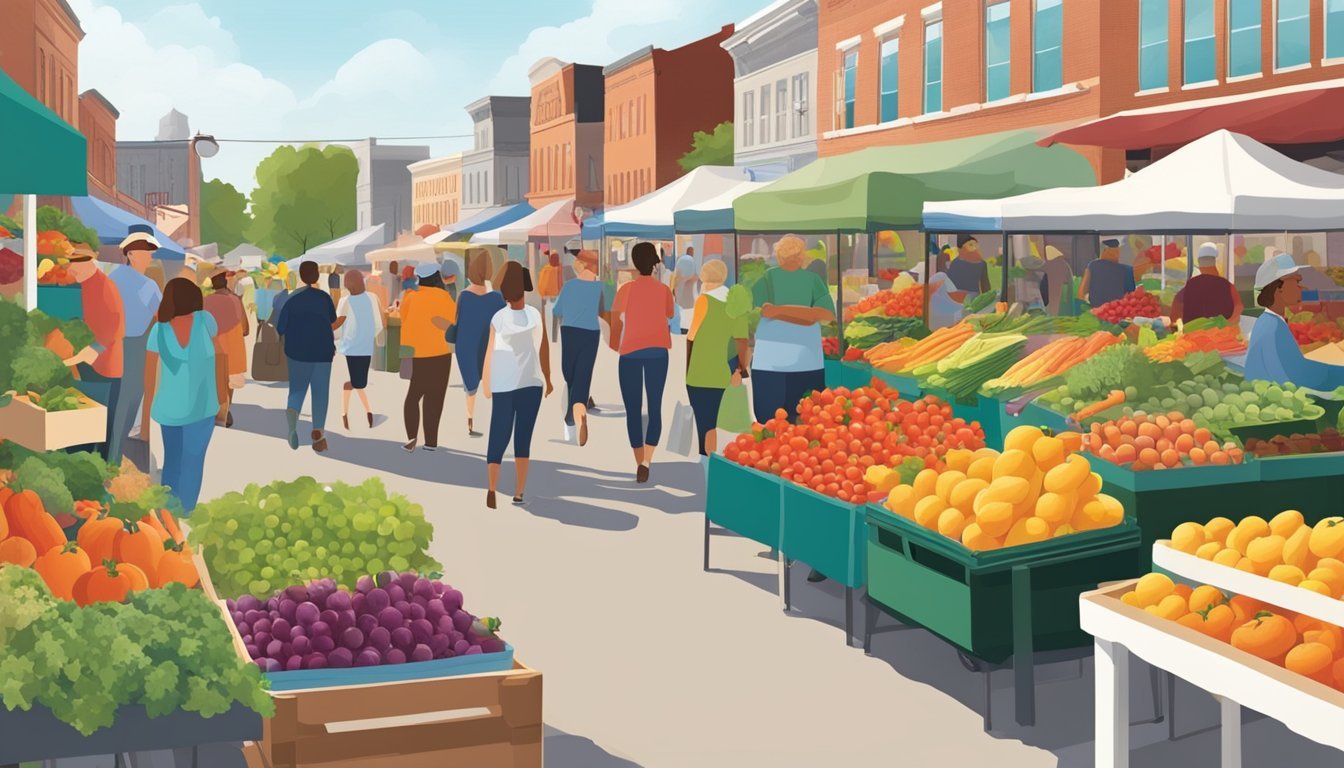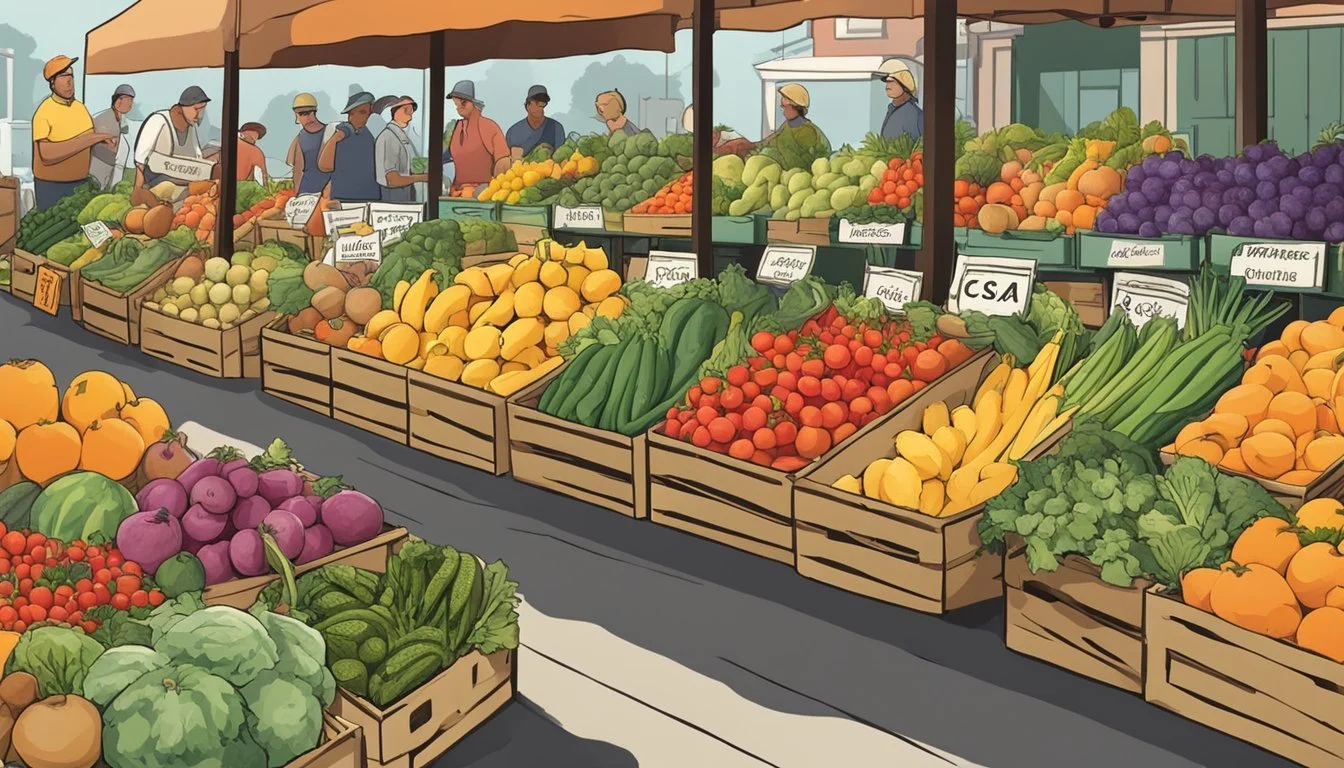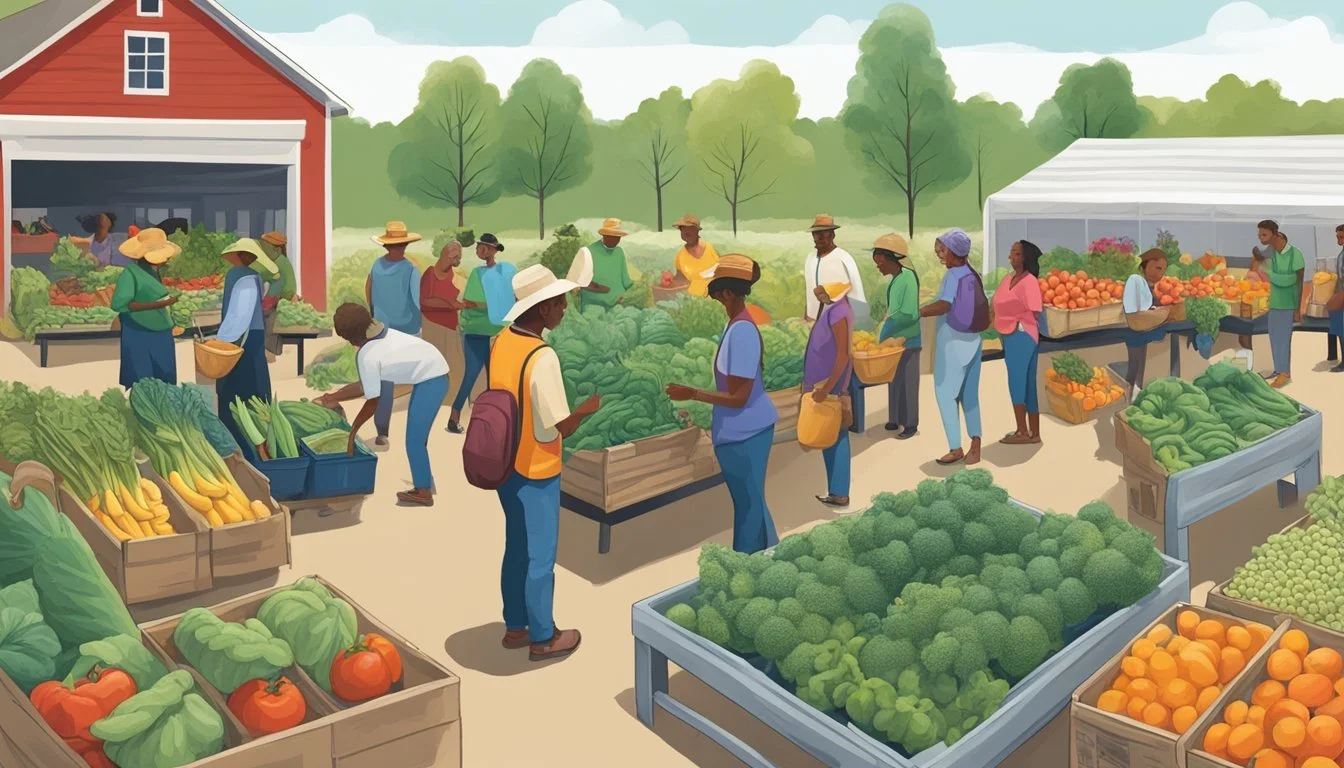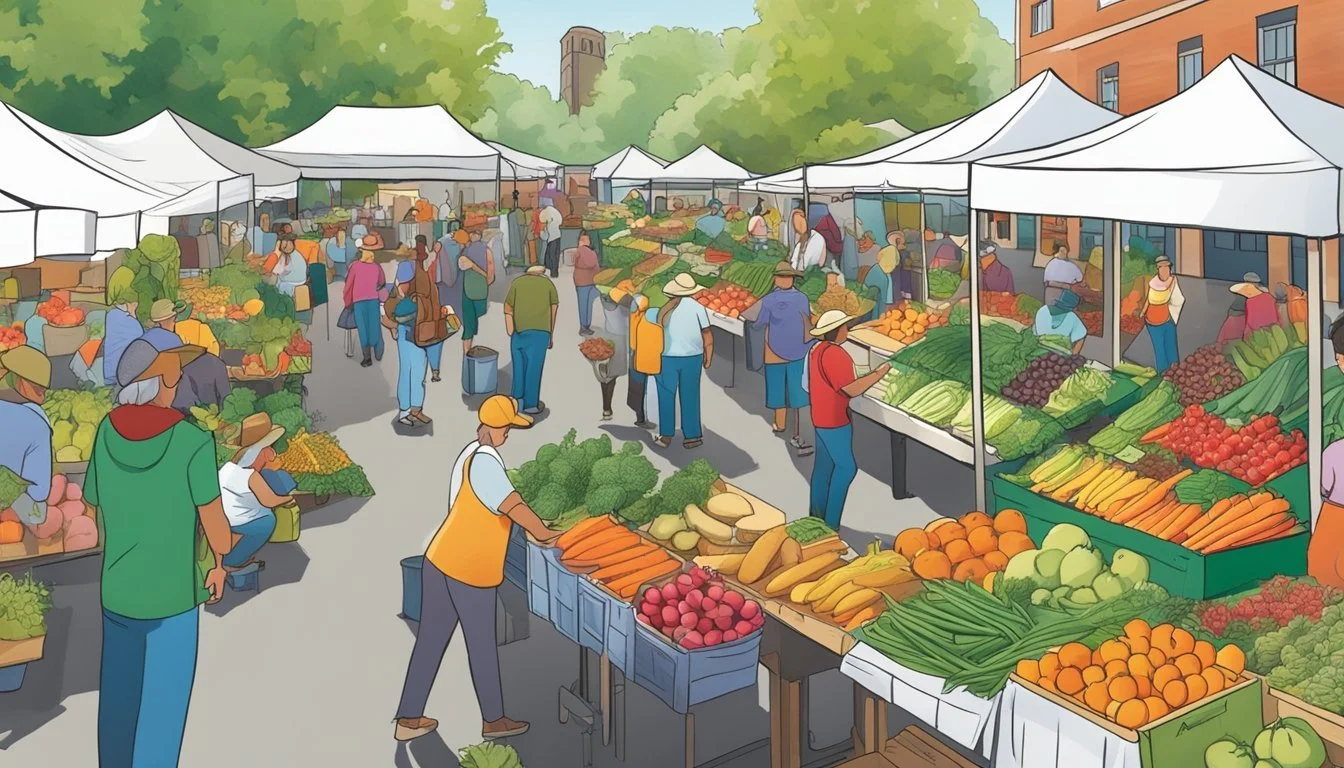Community Supported Agriculture in Louisville, KY
A Guide to Local CSAs
Community Supported Agriculture (CSA) represents a growing movement towards sustainable food systems in Louisville, Kentucky. It’s a model where consumers invest in local farms at the start of the growing season, and in return, they receive a weekly or biweekly share of the harvest. This partnership benefits the community by ensuring farmers have a guaranteed market for their produce, while consumers enjoy access to fresh, locally-grown fruits, vegetables, herbs, and sometimes even additional farm products like eggs and meat.
In Louisville, the embrace of CSA programs reflects a commitment to local food economies and sustainable agricultural practices. Consumers are not only provided with a connection to the source of their food but are also contributing to the financial stability and success of local farmers. CSA members typically receive a diverse array of seasonal produce throughout Kentucky's growing season, which typically spans from May to October.
The impact of CSA on the Louisville community extends beyond the dinner table. It fosters relationships between farmers and consumers, encourages agricultural education, and promotes environmental stewardship. By investing in local CSAs, Louisville residents are playing a crucial role in the viability of local farms and the health of the environment, ensuring a resilient food system for the region.
Understanding CSA
Community Supported Agriculture, or CSA, represents a model where individuals directly support local farms and receive a portion of the harvest. This mutually beneficial arrangement fosters community engagement and promotes sustainable farming practices.
Principles and History
CSA began as a response to the growing need for a closer connection between consumers and the food they eat. It roots in the idea of shared risk and reward between farmers and their community. Participants buy shares from a local farm, and in return, they receive regular deliveries of fresh produce or other farm products. This model provides stability for farmers, allowing them to have a secure market for their produce and financial support in advance of the season.
Benefits of CSA
The benefits of participating in a CSA are numerous both for the consumers and the producers. For consumers, they gain access to fresh, seasonal produce and often have the ability to visit the farms and see where their food is coming from. It also creates a sense of security in knowing that their food source is stable and local. Farmers benefit from the stability of having a guaranteed income through pre-sold shares, which helps with cash flow and planning. The community aspect cannot be understated – both consumers and producers often feel a stronger sense of connection through the CSA. This system also encourages sustainable farming practices, as it often eliminates the need for long-distance transportation and excessive packaging.
Local CSA Farms
Louisville's CSA landscape is enriched by a variety of local farms that provide the community with fresh, often organic, produce straight from their fields. These farms offer a direct connection between consumers and the people who grow their food.
Elmwood Stock Farm
Elmwood Stock Farm, a sixth-generation family farm, is committed to sustainable and organic farming practices. As a USDA Certified Organic farm, they offer CSA shares that include a diverse selection of vegetables, meats, and eggs, connecting Louisville residents with wholesome farm-fresh products.
Rootbound Farm
Rootbound Farm is a Certified Organic farm located in Crestwood, KY, providing the Louisville area with organic vegetables, chicken, eggs, and lamb. Their CSA program is at the heart of their market, emphasizing their role as local farmers staunchly invested in the health of their community and land.
Barr Farms
Barr Farms, operated by a family of dedicated farmers, practices regenerative agriculture to maintain the ecological integrity of their land. The farm offers CSA shares featuring a wide array of produce, promoting community engagement through sustainable farming methods.
Ashbourne Farms
Located in the rolling hills near Louisville, Ashbourne Farms prides itself on producing a variety of high-quality, sustainably farmed products. While not explicitly noted as certified organic, their dedication to responsible farming techniques supports the overall ethos of Louisville's local agricultural community.
CSA Offerings
Community Supported Agriculture in Louisville, KY, features a range of share options to accommodate diverse preferences, from certified organic produce to grass-fed meats, ensuring fresh, high-quality seasonal produce for the community.
Types of Shares
Full/Regular shares: These are designed to meet the needs of families or individuals who frequently cook at home. On average, these shares range from $616-$704 for the season, translating to approximately $28-$32 weekly.
Small/Mini shares: For smaller households or those with less demand for produce, small or mini shares are available at a seasonal cost of $462-$506, roughly amounting to $21-$23 per week.
Organic and Grass-Fed Options
Certified Organic Farms: Many CSAs, like Rootbound Farm in Crestwood, KY, provide certified organic vegetables, evincing a commitment to sustainable and pesticide-free farming practices.
Grass-fed and Pastured Meats: Options extend beyond produce to include meats such as chicken, lamb, and grass-finished beef, as well as pastured eggs, which are often part of CSA offerings in the Louisville area.
Seasonal Variety
Spring and Summer: Expect a vibrant variety of mixed vegetables, fresh herbs, and fruits, emblematic of the growing season. This extends to include products like honey and fresh-cut flowers, adding diversity to the CSA shares.
Fall and Winter: Seasonal produce shifts to include an array of root vegetables and hardy seasonal greens alongside a continuous supply of high-quality meats, such as pork and grass-fed beef, which are available year-round. Some CSAs also offer homemade broth as a warm addition to the colder months.
How to Join a CSA
Participating in a CSA program in Louisville, KY, offers individuals a way to purchase fresh, healthy seasonal produce directly from local farmers. Shareholders get subscriptions, commonly known as "shares," that provide a regular supply of agricultural products throughout the growing season. Here's how to become part of a CSA program.
Selecting the Right CSA Program
When choosing a CSA program, individuals should consider the types of products offered and whether these align with their dietary preferences and needs. They may look for a program that offers a variety of vegetables, fruits, herbs, and potentially even flowers or eggs. Accessibility is key, so finding local pickup locations within Louisville is also important. The size of the share—whether full or small—should fit the person’s or family’s consumption rate to ensure all the produce is utilized.
Additionally, the cost factor is crucial. CSA shares in Louisville vary in price, often calculated on a weekly basis for the duration of the season. One might expect prices to range between $21 to $32 per week, based on the size and contents of the share.
Signing Up and Shareholder Responsibilities
Once a CSA program is selected, individuals can sign up by contacting the farm directly, which may be achieved through provided email addresses or phone numbers. A partial payment is typically required upfront to give the farm guaranteed working capital for the year, securing the individual's shareholder status in the process.
Shareholders have the responsibility to understand the terms of the CSA, including pickup locations and times, duration of the CSA season, and what happens to their share if they’re unable to collect it. They should also be prepared for the variability of agriculture, as CSA shares might change based on what is currently harvestable. Participating in a CSA is a commitment to the local food economy and requires active engagement by the shareholder throughout the season.
Supporting the Local Economy
Community-Supported Agriculture (CSA) programs in Louisville, KY, play a crucial role in bolstering the local economy. They allow consumers to directly support farmers and sustainable farm practices while receiving fresh, seasonal produce, livestock products, and more.
Impact on Local Farmers
CSA programs provide local farmers with a reliable income stream, which is essential for the stability and growth of small farms. By participating in CSAs:
Farmers gain financial security through upfront payments for CSA shares.
This model helps in maintaining market gardens and sustainable farm operations.
Community Involvement and Education
The community invests in local farms through CSA programs, fostering a connection between consumers and food producers. CSA's often incorporate educational aspects:
They promote knowledge sharing about local farming practices.
Participants gain an understanding of seasonal eating and can visit the farms, lending to a greater sense of community involvement.
CSA Distribution and Logistics
Community Supported Agriculture (CSA) programs in Louisville, KY facilitate access to fresh, locally-grown produce through structured distribution and logistics systems. These systems ensure that members receive their shares with efficiency and care, supporting the viability and sustainability of local farms.
Delivery and Pickup Options
CSA members generally have the flexibility to choose between delivery and pickup options. Rootbound Farm, as an example, offers a year-round webstore where consumers can place orders. Participants may opt for local pickup at designated farmers markets or other community locations within Louisville. Alternatively, some CSAs may provide home delivery services, which bring the advantages of convenience and direct access to fresh produce.
Packaging and Preservation
The preservation of freshness and quality from farm to table is paramount in CSA operations. Member shares are often distributed in reusable or recyclable packaging to maintain produce integrity and minimize waste. On-farm activities like washing and immediate cooling of harvests are crucial steps. CSA programs ensure that the journey from farm to consumer's hands, whether through deliveries or pickup, upholds the highest standards of freshness and quality.
Challenges and Considerations
Engaging in Community Supported Agriculture (CSA) in Louisville, KY requires careful consideration of the risks involved and the impact of natural factors. Participants must grapple with the realities of farming and the variables that affect crop production.
Understanding the Risks
Community Supported Agriculture is a relationship between farmers and consumers that hinges on mutual reliance. Subscribers finance the farm's operations upfront, making them shareholders of the farm's output. However, this model introduces financial risks as shareholders are typically not guaranteed a specific quantity of produce. If external factors adversely affect the farm, such as disease or pest outbreaks, shareholders may find the quantity and possibly the quality of produce reduced. This underscores the importance of clear communication on the inherent uncertainty in agriculture.
Seasonal and Environmental Factors
In Louisville's CSA systems, sustainable farming efforts are influenced by seasonal variations and the environment. Climate conditions dictate the growing season, which usually spans May to October. CSA farms must choose crops that can thrive within the region's environmental parameters and adapt to shifting climatic patterns. Seasonal factors such as extreme weather may hinder the farm's capacity to produce consistently. CSA participants should understand that sustainable farming practices, while beneficial for the environment and human health, may experience challenges in ensuring a predictable harvest.
Regional Focus
Community Supported Agriculture (CSA) programs in the Louisville area have embraced the rich agricultural backdrop of Kentucky to establish a network of local farms offering produce subscriptions. This brings locally grown food directly to consumers and helps foster an inclusive community around sustainable agriculture.
CSA Farms in Greater Louisville Area
Crestwood hosts Rootbound Farm, a Certified Organic establishment offering a range of produce, including vegetables, chicken, eggs, and lamb through its CSA program. The farm prioritizes CSA members, but also sells at farmers' markets and provides a webstore for year-round local pickup. Shelbyville and La Grange in the Shelby region benefit from proximity to Louisville for similar programs, sourcing seasonal produce to CSA subscribers.
Lexington, while slightly more distant, offers CSA programs through farms like the one on Emmert Farm Lane, which caters to a more focused community of faculty, staff, and students. Its array of vegetables, fruits, herbs, and flowers maintains the tradition of active agricultural participation reminiscent of the CSA model.
Expansion into Border States
CSAs in the Louisville area extend beyond the Kentucky border into Southern Indiana, leveraging the rich soils of the Ohio River Valley. By tapping into cross-border communities, these farms are not only expanding their market but also establishing Louisville as a central hub for CSA distribution in the region.
Adjacent states like Northern Kentucky and Southern Indiana are an integral part of the region's CSA network, providing variety and increasing the consumer base for Kentucky's farmers. In this way, farms from areas like Elizabethtown, Richmond, and Berea potentially experience growth by reaching into the Louisville CSA customer base, thereby bolstering both local economies and sustainable agriculture practices.
Additional Resources
Community Supported Agriculture (CSA) in Louisville, KY, not only provides fresh, locally-grown produce but also offers valuable resources for education and community engagement. The following subsections detail where CSA members can find educational material, including recipes, and how they can participate in community events and volunteer activities.
Educational Material and Recipes
CSA members often seek guidance on how to best utilize their weekly produce. LocalHarvest and Edible Kentucky are two outstanding sources that provide a wealth of educational materials including:
Seasonal recipes that focus on using water efficiently and creating wholesome meals from the CSA shares.
Weekly newsletters that offer insights into the produce of the week and detailed explanations on how to store and prepare them.
Subscribers to these resources can enhance their culinary skills and make informed choices towards a sustainable lifestyle.
Community Events and Volunteering
For individuals looking to engage more deeply with their local food community, numerous volunteering opportunities with CSAs and food coalitions in Louisville are available. These can range from helping out on the farms to assisting at CSA pick-up locations. The following represents opportunities to connect:
Kentucky Farm Share Coalition: Offers chances for shareholders to participate in farm activities and community events.
Food in Neighborhoods: Organizes events where members can volunteer, learn more about sustainable agriculture, and mingle with fellow CSA members.
Each event is not only an opportunity to learn and contribute but also to reinforce the connection between consumers and farmers while supporting the local food economy.








